You need to choose between reliability and speed.
Basic – is as fast as a single drive
JBOD – also as fast as a single drive
RAID0 – as fast as all drives speed combined
RAID1 – write as fast as one disk, reading as fast as all drives combined
SHR1 + RAID5 – write as fast as all drives (minus 1), read as fast as all drives combined (minus CPU calculations )
SHR2 + RAID6 – write as fast as all drives (minus 2), read as fast as all drives combined (minus CPU calculations )
RAID10 – combined two RAID1 blocks speed. faster than a RAID6 and still have the same redundancy. (probably fastest + safest option for a 2 bay)
RAID50- faster than RAID5 and have 2 disk redundancy
RAID60 – faster than RAID6 with 4 drive redundancy
If you have a 2 bay NAS you will have options like :
Basic– each drive will exist on its own. If you have 2x – you will see two disks/volumes. Every drive is on its own – if it fails, you lose data on that disk. Others are safe. (do a backup)
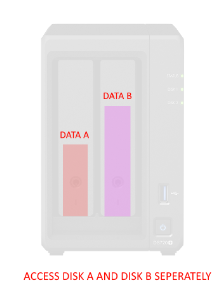
JBOD – all hard drives will be merged together under one big drive/volume. In the background, data will be written on the first disk first. And then when it is full, data then will be written on a disk 2 and so on. If it fails, you lose data on that disk. You can recover other disks (do a backup)
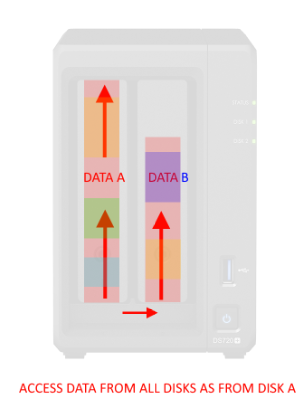
RAID0 – All disks are merged into one disk/volume. Data will be distributed equally across all drives. So half data on one disk and another half on another disk. If it fails, you lose data on all disks (do a backup)
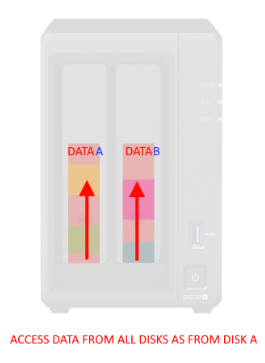
RAID1 – All disks are merged into one disk/volume. Data on each drive will be mirrored/duplicated. If one drive fails, you have a copy on another drive.
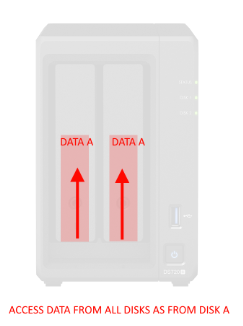
SHR1 – (Similar to RAID5) All disks are merged into one disk/volume. Data will be written across all drives. Each drive will have a reserved storage block keeping data about other disks (size of 1 disk will be reserved and unavailable for use). If one drive fails, you have a copy of the data stored across the remaining drives. You can also mix two different size drives (more popular on 4+ bays or via expansion). If two drives fail – you lose data.
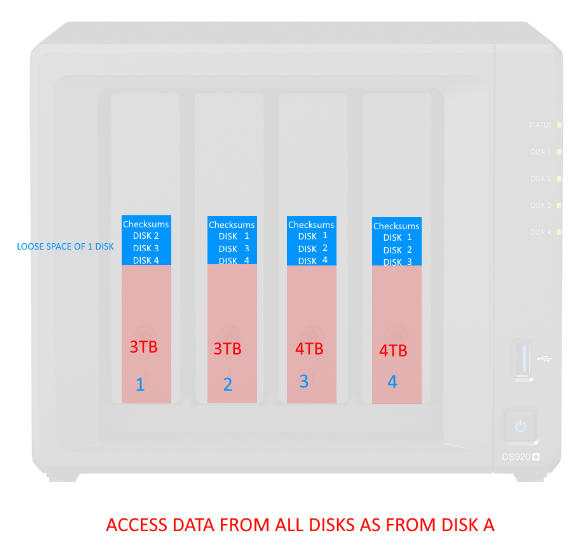
On three or more bays NAS (or 2bay with expansion) you will see additional options:
SHR2 – (Similar to RAID6) All disks are merged into one disk/volume. Data will be written across all drives. Each drive will have a reserved storage block keeping data about other disks (size of 2 disks will be reserved and unavailable for use). If two drives fail, you have a copy of the data stored across the remaining drives. You can also mix two different size drives (more popular on 4+ bays or via expansion). If three drives fail – you lose data.
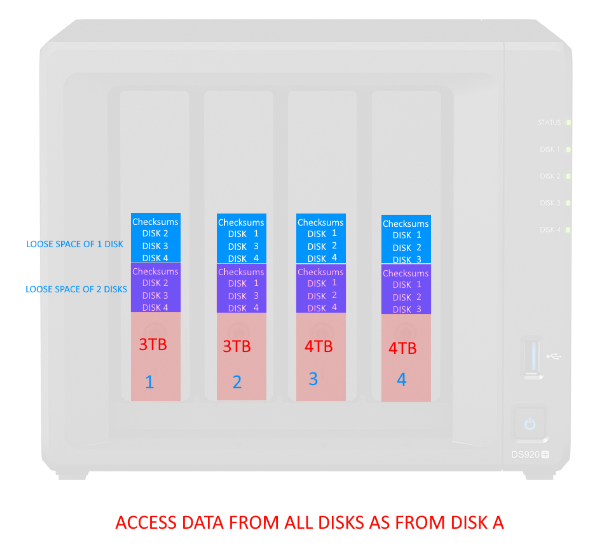
RAID5 – All disks are merged into one disk/volume. Data will be written across all drives. Each drive will have a reserved storage block keeping data about other disks (size of 1 disk will be reserved and unavailable for use). If one drive fails, you have a copy of the data stored across the remaining drives. If two drives fail – you lose data.
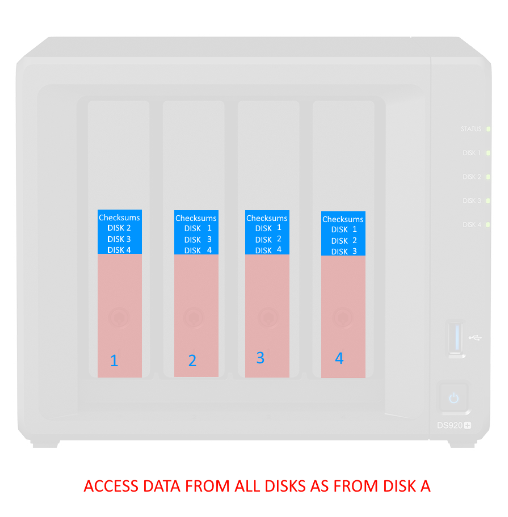
RAID6 -All disks are merged into one disk/volume. Data will be written across all drives. Each drive will have a reserved storage block keeping data about other disks (size of 2 disks will be reserved and unavailable for use). If two drives fail, you have a copy of the data stored across the remaining drives. If three drives fail – you lose data.
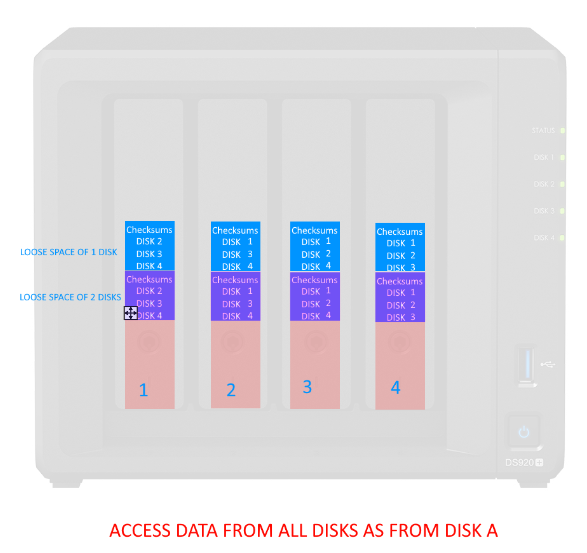
RAID10 – (two blocks of RAID1)
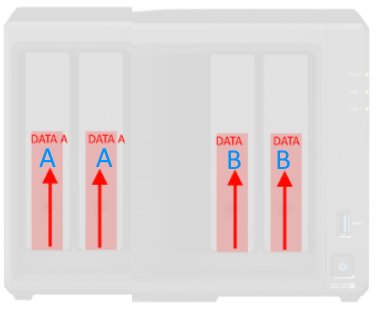
RAID50 – (two blocks of RAID5 merged under RAID0)
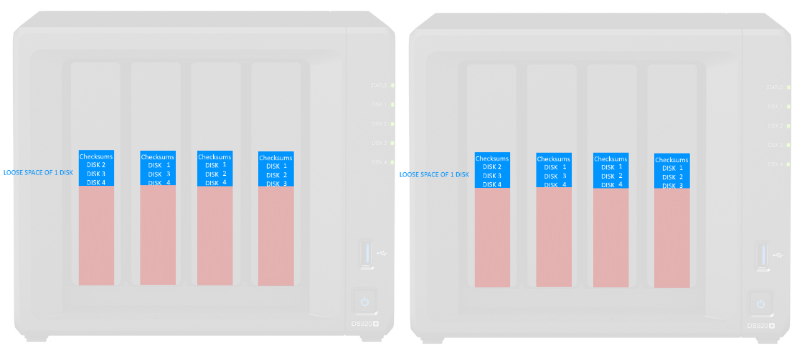
RAID60 – (two blocks of RAID6 merged under RAID0)
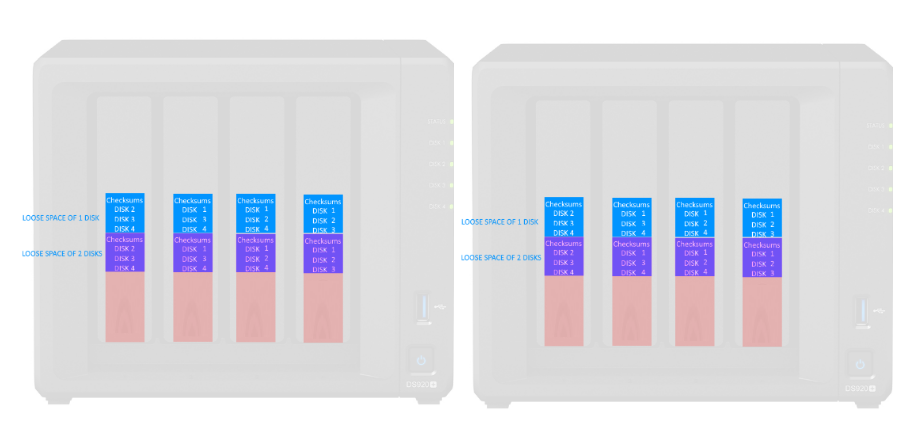
| Where to Buy a Product | |||
|
|
    
|

|
VISIT RETAILER ➤ |
 |
    
|

|
VISIT RETAILER ➤ |
We use affiliate links on the blog allowing NAScompares information and advice service to be free of charge to you. Anything you purchase on the day you click on our links will generate a small commission which is used to run the website. Here is a link for Amazon and B&H. You can also get me a ☕ Ko-fi or old school Paypal. Thanks! To find out more about how to support this advice service check HERE
Synology FS200T NAS is STILL COMING... But... WHY?
Gl.iNet vs UniFi Travel Routers - Which Should You Buy?
UnifyDrive UP6 Mobile NAS Review
UniFi Travel Router Tests - Aeroplane Sharing, WiFi Portals, Power Draw, Heat and More
UGREEN iDX6011 Pro NAS Review
Beelink ME PRO NAS Review
Access content via Patreon or KO-FI
Discover more from NAS Compares
Subscribe to get the latest posts sent to your email.





Something I’ve looked for but never really found discussed is:
Suppose I have a NAS setup as RAID5, if a hard disk fails then the RAID will protect me from loss of data BUT suppose the hardware of the NAS itself fails and suppose the NAS unit I have is no longer available:
How would I go about getting the data files off the existing hard drives and onto a new NAS?
You do not need an exact model to move your drives over. Simply choose a NAS from the same range. For example you can move drives from ds218+ to ds220+ or DS923+. No need for the reset. Simply continue where you left off.
Hi Eddie, thanks for the advice. Is this true for units from the same manufacturer or could you move them into a different manufacturers unit? I should be able to test this soon as I am planning on migrating from a WD EX4100 to a QNAP TS464.
regards
PhilipJ
No, you can only move drives to the same manufacturer NAS. Moving from WD will require copying data first to the backup. Or if this is the same file system like EXT then you could connect via USB docking station.